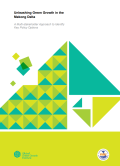
This report describes efforts by the ClimateWorks Foundation and the World Bank to quantify the multiple economic, social, and environmental benefits associated with policies and projects to reduce emissions in select sectors and regions.
The report has three objectives: 1) to develop a holistic, adaptable framework to capture and measure the multiple benefits of reducing emissions of several pollutants; 2) to demonstrate how local and national policymakers, members of the international development community, and others can use this framework to design and analyze policies and projects; and 3) to contribute a compelling rationale for effectively combining climate action with sustainable development and green growth worldwide.
This study analyses trends and opportunities for trade among developing countries (i.e. South-South trade) in selected environmental goods, in order to assess the contribution such trade can make to a green economy transition. The term ‘developing countries’ includes all countries and territories listed as developing economies in the UNCTAD Handbook of Statistics (UNCTAD, 2012). The study focuses on South-South trade flows in several RE products and their components, including solar photovoltaic (PV) cells and modules, wind turbines, hydroelectric turbines, biomass feedstock, solar water heaters and solar lighting equipment, as well as other select environmental goods. The latter include water filtering and purification equipment and environmentally preferable products, such as organic agricultural goods.

This Scoping Report was produced through cooperation between the Viet Nam National Mekong Committee (VNMC) and the Global Green Growth Institute (GGGI) in reflecting a shared understanding that improved water resource management was considered as the key to sustainable development. The report provides a wealth of information to capture the link between water and economic growth in the Mekong Delta context and identifies the policy options which would support green growth in the Delta, from a conceptual viewpoint. It also provides an assessment tool which can prioritize green growth options and facilitate preparatory works for green growth policies in the Mekong Delta.
This report highlights the main outcomes of the European Union Water Initiative (EUWI) in the Eastern Europe, the Caucasus and Central Asia (EECCA) countries. Section 2 highlights specific achievements at the country level in the context of national policy dialogues facilitated by the OECD and UNECE. Section 3 focuses on water diplomacy, highlighting progress in the context of transboundary water management and the regional dimension of the EUWI EECCA. Section 4 looks ahead and suggests avenues for future work in the region, highlighting where the input of the EUWI and EU member states can make a difference. Section 5 describes how National Policy Dialogues work as a process for achieving policy reform. In addition, country fiches highlight in more detail specific achievements at country level in the context of national policy dialogues facilitated by the OECD and UNECE.
This policy manuel aims to help the European Union’s Eastern Partnership (EaP) countries – Armenia, Azerbaijan, Belarus, Georgia, Moldova and Ukraine – design or reform economic instruments related to environmentally harmful products. Within the broad range of economic instruments to promote greener growth, this manual addresses instruments directed at changing consumer purchasing behaviour (product taxes) and those targeting improvements in waste generation and management (deposit-refund systems and extended producer responsibility schemes). The main target audience of this policy manual includes government stakeholders (ministries of environment, economy and finance) as well as business communities, non-governmental and academic institutions in EaP countries.
